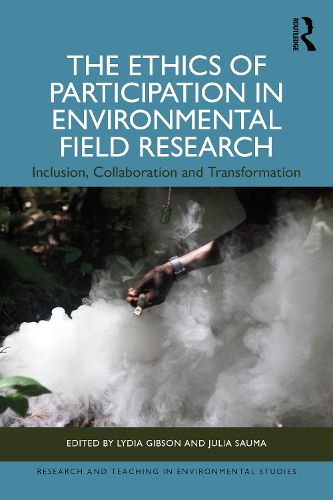Readings Newsletter
Become a Readings Member to make your shopping experience even easier.
Sign in or sign up for free!
You’re not far away from qualifying for FREE standard shipping within Australia
You’ve qualified for FREE standard shipping within Australia
The cart is loading…






This book provokes important new discussions about ethical participation in environmental field research by bringing to the fore the fluid nature of both ethics and participation.
Local participation is increasingly seen as a central and ethical part of environmental research; as such, many environmental efforts are becoming increasingly participatory. Participation, as a string of literature has shown, has many political, economic, social, and epistemic consequences, and ethics is fluid, polyvalent, and contextual. "Right is right, wrong is wrong" is dangerous rhetoric that centres western experiences and forecloses the myriad realities and relations bundled within and forced upon marginalised experiences. Both participation and ethics - as concepts and praxis - cast decades-long shadows over field research (particularly in anthropology), yet much of these discussions are left at the threshold of interdisciplinary spaces, where participation, traditional and Indigenous knowledge, co-production are brought in to sanitise and legitimise environmental actions. Where are our lessons learned and what ought we to make of their absence? The first half of this volume offers ethnographic examples that allow us to begin to ask whether participation (in the capitalist machinery and colonial legacies of academic knowledge) is ever even ethical. The second half of the book is dedicated to anti-solutions: refusals to define problems and approaches in fixed, closed terms from which equations, calculations, and solutions can be derived.
This book will be of great interest to all students and researchers across natural and social sciences whose fieldwork includes engagement with local communities and stakeholders, as well as conservation policymakers and practitioners who consult and work with local communities.
$9.00 standard shipping within Australia
FREE standard shipping within Australia for orders over $100.00
Express & International shipping calculated at checkout
This book provokes important new discussions about ethical participation in environmental field research by bringing to the fore the fluid nature of both ethics and participation.
Local participation is increasingly seen as a central and ethical part of environmental research; as such, many environmental efforts are becoming increasingly participatory. Participation, as a string of literature has shown, has many political, economic, social, and epistemic consequences, and ethics is fluid, polyvalent, and contextual. "Right is right, wrong is wrong" is dangerous rhetoric that centres western experiences and forecloses the myriad realities and relations bundled within and forced upon marginalised experiences. Both participation and ethics - as concepts and praxis - cast decades-long shadows over field research (particularly in anthropology), yet much of these discussions are left at the threshold of interdisciplinary spaces, where participation, traditional and Indigenous knowledge, co-production are brought in to sanitise and legitimise environmental actions. Where are our lessons learned and what ought we to make of their absence? The first half of this volume offers ethnographic examples that allow us to begin to ask whether participation (in the capitalist machinery and colonial legacies of academic knowledge) is ever even ethical. The second half of the book is dedicated to anti-solutions: refusals to define problems and approaches in fixed, closed terms from which equations, calculations, and solutions can be derived.
This book will be of great interest to all students and researchers across natural and social sciences whose fieldwork includes engagement with local communities and stakeholders, as well as conservation policymakers and practitioners who consult and work with local communities.